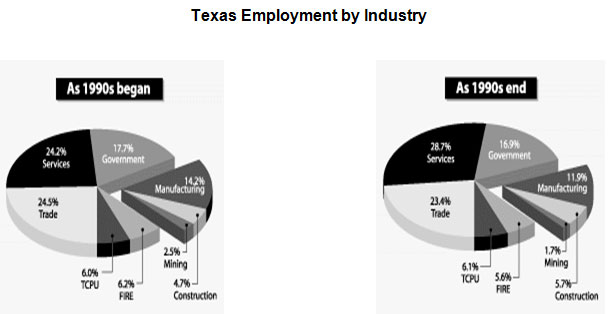Since the discovery of oil at Spindletop in the early 1900s, the oil and gas industry has been an important part of the Texas economy. The oil and gas industry had a far-reaching impact on Texas in many ways.
![]() Click on each image below to learn more.
Click on each image below to learn more.
Between the 1970s and the 1980s, the Texas economy experienced continued growth. By the early 1980s, manufacturing became an important industry. Along with the oil industry, there were other factors that led to the economic growth of the 1980s.
By 1982 a worldwide recession, mainly due to the overproduction of oil, began to impact Texas. Oil prices fell and the need for oil decreased dramatically.
Let’s think about this: How do you think the decrease in oil demand affected workers?

Unemployment in Texas rose from 6.9 percent in 1982 to 8 percent in 1983. The changes in the oil industry caused changes in other industries. Banks that had invested in the oil industry also lost money as a result of the oil bust.
Throughout the decade, the 1990s brought economic growth to Texas; unemployment dropped and new jobs were created in various industries.
Compare the two pie charts from the Windows on the State Government website that represents jobs in Texas from the 1990s. Answer the following questions in your notes.

Source: Chart1 and Chart2 ecodata, Windows on State Government
Interactive popup. Assistance may be required.
The industry that saw the greatest increase in jobs during the 1990s was the service industry. These jobs included non-farming services, such as technology, financial, business, and education and health services.
Interactive popup. Assistance may be required.
The greatest decrease in jobs during the 1990s was in the trade industry. Retail and wholesale trade are included in this industry.
As Texas entered the 21st century, there was a focus on new industries for the state. According to the Texas Workforce Commission, there were several industries that were identified as engines of job creation and economic development in the 21st century.
Let’s think about this: If the list above represents industries that will create jobs in the 21st century, how will this impact the workers of the 21st century?